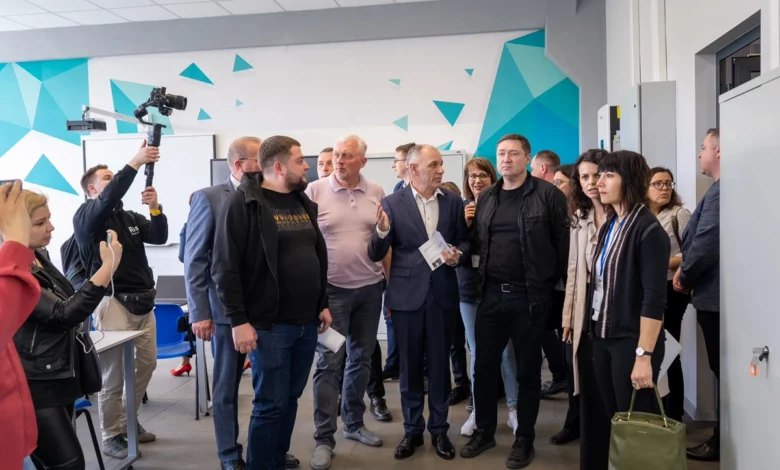
It was opened with the support of GIZ Ukraine as part of the project “Supporting Structural Change in Ukraine’s Coal Regions”.
Today, April 10, the Renewable Energy Training Center was officially launched in Chervonohrad. The innovative space for industrial training was launched on the basis of the Chervonohrad Professional Mining and Construction Lyceum.
According to Maksym Kozytskyi, head of the Lviv Regional State Administration, the Renewable Energy Training Center is the first to be opened with the support of GIZ. Work began last year. UAH 12.6 million was raised to create the center. Of this amount, GIZ funding amounted to UAH 6.2 million, the regional budget to UAH 4.6 million, the TG to UAH 1.3 million, and more than half a million from the lyceum’s special fund.
“This is the 46th training center in the region and the first one in cooperation with GIZ. Lviv region is a leader in Ukraine in the development of the network of training centers.
I thank everyone involved in the opening for their cooperation, co-financing, consistency and understanding of where our vocational education is heading.
The teachers have undergone advanced training in renewable energy. Electricians specializing in green energy will be trained here. “Our country is moving towards decentralized energy, so this is an extremely necessary profession.
The center will cooperate with industrial enterprises and companies that are developing in the field of renewable energy, so this is a great opportunity for students to find a job in their field of study right away,” said Maksym Kozytskyi, head of the Lviv Regional Vocational School.
The center has a laboratory, a workshop, a methodology room, a locker room, and a recreation area. The training center is equipped with a 15 kW hybrid solar power plant, which allows the center to be fully autonomous, as well as an air-to-water heat pump that provides heat in winter and serves as a cooling system in warm weather.
In addition, there are laboratory stands for mastering the skills of electrical installation and installation of a hybrid solar power plant, workbenches for locksmithing and installation tables for electrical installation, a laboratory station in a complex: a solar collector, a 3 kW hybrid solar power plant and a geothermal heat pump, and interactive training equipment.
“Such a step during the war is very important. In the future, green energy will be all over the country, so it is extremely important for our infrastructure to support it, because we understand that the enemy is shelling the infrastructure, and therefore I believe that we need to develop this industry for our future,” said Maksym Lakiza, a 1st year student at the Renewable Energy Center.
The Renewable Energy Center will teach installation and maintenance of renewable energy systems, installation of support parts, fasteners of renewable energy systems, installation of renewable energy system equipment, adjustment, testing and launch of renewable energy systems, maintenance and repair of renewable energy systems.
The training center was created to train students in the profession of “Electrician for the repair and maintenance of solar power installations”; currently, 51 students are studying in this profession. At the same time, 60 students will be able to study at the center.
In the future, the potential of the Renewable Energy Center is to be expanded. In particular, they plan to modernize the laboratory of general electrical engineering and install additional solar power plants to ensure the energy independence of the educational institution. It is also planned to introduce a new license “Master of Installation and Maintenance of Renewable Energy Systems”.
For reference.
The process of fair transformation of the Chervonohrad Coal Microregion is being implemented under the Program “Support for Structural Change in the Coal Regions of Ukraine” implemented by the German Society for International Cooperation (GIZ Ukraine) on behalf of the German Federal Ministry for Economic Affairs and Climate Protection.
The Chervonohrad microregion is a pilot project, and the practice is planned to be implemented in other regions of Ukraine in the future.

